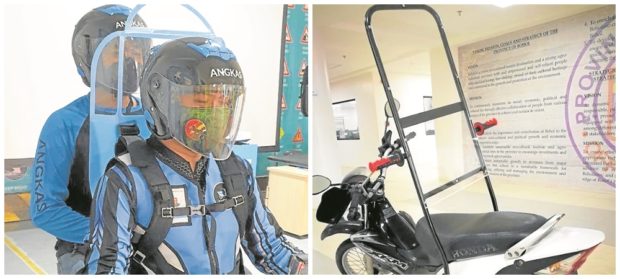MANILA, Philippines — Wait until you get infected with COVID-19 and then comment and criticize the mandatory use of barriers for motorcycle pillion riding (back-riding), Interior Secretary Eduardo Año said Friday amid sustained criticism.
“Pag-aralan niyo muna bago kayo magcomment at hintayin natin na ma-infect ka ng COVID saka ka magcomment,” Año said in a press briefing at Camp Crame, Quezon City on Friday.
(Assess the issue before making comments, and wait until you get infected with COVID before you comment.)
“Magbabago ang perspective mo sa buhay kung magkasakit ka o isang member ng pamilya mo naghahanap ng ICU (intensive care unit), naghahanap ng medical ventilator, yan saka sabihin natin na mali pala ang paggamit ng barrier shield,” he added.
(Your perspective will change if you get sick or if a family members gets sick and you start looking for an ICU bed, mechanical ventilator.)
The government’s task force against COVID-19 required the use of barriers between the motorcycle driver and backrider in a bid to suppress the spread of COVID-19.
In MECQ areas, pillion riding is allowed for frontliners since mass transportation is suspended.
“Kailangan dito pag-aralan ang issue sabi ko nga, walang problema sa expertise ng pag-mo-motor pero sa pandemic huwag mo sabihing experto ka, pag-aralan mo muna,” he said.
(The issue must first be studied. As what I have said, I have no problem with expertise on motorcycles but for the pandemic, do not say that you are an expert. Study the issues.)
‘Motorcycle barrier a deterrent vs virus’
Año, in defending the motorcycle barriers, said the same is scheme is being enforced in Indonesia and other countries.
“Yes, oo. Hindi lang tayo gumagamit nito. Nauna pa nga yung Indonesia at iba pang mga countries kasi yung virus nagtatravel via airborne at kung malapit distansya mo pwedeng directly to the person,” he said when asked if the government has evidence that the barriers can protect riders from COVID-19.
(Yes. We are not the only ones using this. Indonesia and other countries are applying this rule because the virus is airborne and can be transmitted directly to another person.)
Año said the barrier can protect the rider and passenger whenever they temporarily remove their helmets during heavy traffic or hot weather.
“Ang sabi nila enough na daw yung helmet at face mask kasi yung helmet may face shield din noh. Pero nung ni-review namin yung mga videos along the roads, ang nangyayari 20 percent o 30 percent yung gumagamit ng motor tinataaas yung face shield siguro naiinitan. Kapag nagkaroon ng traffic o kaya nasa intersection tinatanggal nila helmet o kaya face shield,” Año said.
(They said it is enough to use helmet and face mask because the helmet has a face shield. But after reviewing videos of motorcyclists along the roads, we learned that 20 percent to 30 percent would remove their face shields maybe because it is hot. If stuck in traffic, they will temporarily remove their helmets or face shields.)
“Instinct yun ng tao gagawin niya yung paraan na giginhawa siya doon nagkakaroon ng transmission. With the barrier shield, kahit tanggalin niya yung helmet niya, protektado pa rin siya,” he added.
(It is their instinct to make themselves comfortable, but that is when viral transmission occurs. With the barrier shield, even if they temporarily remove their helmet, they are still protected.)
